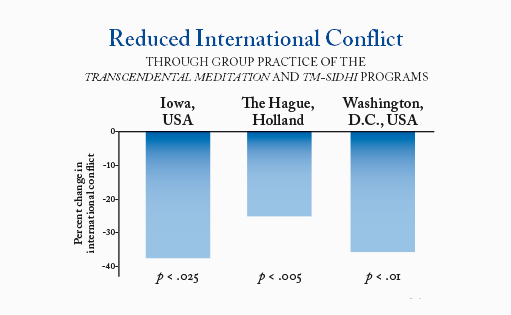Scientific Research about the Transcendental Meditation Program
The Transcendental Meditation technique is the most researched meditation worldwide. Since 1972, over 350 peer-reviewed research studies on the wide-ranging benefits in different areas of life have been conducted at more than 200 independent universities and research centers in 33 countries. Here a small selection.
Physiological Functioning

Physiological indicators of Deep Rest
A meta-analysis (used for drawing objective conclusions from large bodies of research) found that the Transcendental Meditation technique produced a significant decrease in basal skin conductance compared to eyes-closed rest, indicating profound relaxation. Deep rest and relaxation were also indicated by greater decreases in respiration rates and plasma lactate levels compared to ordinary rest. These physiological changes occur spontaneously as the mind effortlessly settles to the state of restful alertness, Transcendental Consciousness.
References: 1. American Psychologist 42 (1987): 879–881. 2. Science 167 (1970): 1751–1754. 3. American Journal of Physiology 221 (1971): 795–799.
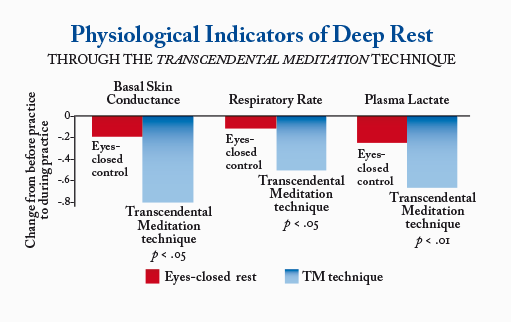

Increased Integration of Brain Functioning
University students who learned the Transcendental Meditation technique, in contrast to students randomly assigned to a delayed-start group, showed significant improvement over a 10-week period on a Brain Integration Scale comprising several EEG measures during task performance. Components of the Brain Integration Scale on which improvement was measured included increased broadband frontal EEG coherence and more efficient preparatory brain responses to stimuli. Students learning the Transcendental Meditation technique also showed decreased sleepiness and faster habituation to stressful stimuli in comparison to controls.
Reference: International Journal of Psychophysiology 71 (2009): 170–176.
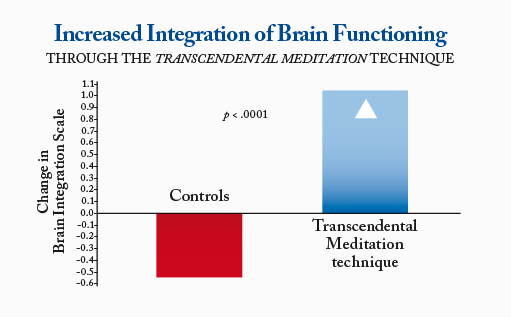
Mental Potential

Optimization of Brain Functioning
Higher levels of EEG coherence measured during the practice of the Transcendental Meditation technique are significantly correlated with increased fluency of verbal creativity; increased efficiency in learning new concepts; more principled moral reasoning, higher verbal IQ, and decreased neuroticism; higher academic achievement; clearer experiences of Transcendental Consciousness; and increased neurological efficiency, as measured by faster recovery of the paired H-reflex.
References: The chart above refers to data from the following four studies: 1. International Journal of Neuroscience 13 (1981): 211–217. 2. International Journal of Neuroscience 15 (1981): 151–157. 3. Scientific Research on the Transcendental Meditation Program: Collected Papers, Volume 1 (1977): 208 –212. 4. Scientific Research on Maharishi’s Transcendental Meditation and TM-Sidhi Programme: Collected Papers, Volume 4 (1989): 2245–2266.


Holistic Improvement in Intellectual Performance
Three randomized controlled studies among secondary school and vocational school students found that, in contrast to controls, those who learned the Transcendental Meditation technique showed significant improvement in five measures of intellectual functioning; they also showed decreased anxiety.
References: 1. Intelligence 29 (2001): 419–440. 2. Personality and Individual Differences 12 (1991): 1105–1116. 3. Perceptual and Motor Skills 62 (1986): 731–738. 4. College Student Journal 15 (1981): 140–146. 5. The Journal of Creative Behavior 19 (1985): 270–275. 6. Journal of Clinical Psychology 42 (1986): 161–164. 7. Gedrag: Tijdschrift voor Psychologie [Behavior: Journal of Psychology] 3 (1975): 167–182./

Education

Increased Self-Actualization
Statistical meta-analysis of all available studies (42 independent outcomes) indicated that the effect of the Transcendental Meditation program on increasing self-actualization is much greater than concentration, contemplation, or other techniques. Self-actualization refers to realizing more of one’s inner potential, expressed in every area of life: integration and stability of personality, self-regard, emotional maturity, capacity for warm interpersonal relationships, and adaptive response to challenges.
References: 1. Journal of Social Behavior and Personality 6 (1991): 189–248. 2. Journal of Counseling Psychology 19 (1972): 184–187.
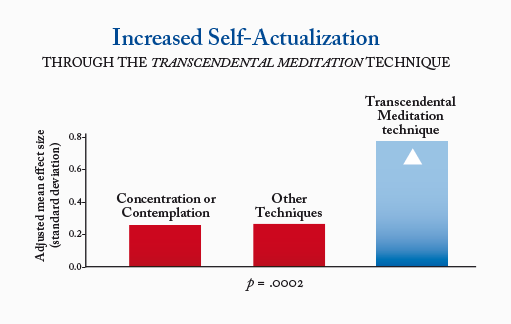
Psychological Health and Behavior

Reduced Psychological Stress
A statistical meta-analysis conducted at Stanford University of all available studies (146 independent outcomes) indicated that the effect of the Transcendental Meditation program on reducing trait anxiety was much greater than that of concentration or contemplation or other techniques. Analysis showed that these positive results could not be attributed to subject expectation, experimenter bias, or quality of research design.
References: 1. Journal of Clinical Psychology 45 (1989): 957–974. 2. Journal of Clinical Psychology 33 (1977): 1076–1078
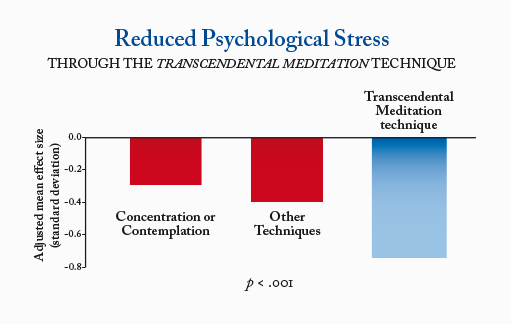

Reduced Drug and Alcohol Use
A comparison of the results of several statistical meta-analyses indicated that the Transcendental Meditation program produced significantly larger reductions in tobacco, alcohol, and non-prescribed drug use than standard substance abuse treatments and standard prevention programs. Whereas the effects of conventional programs typically fall off rapidly within three months, effects of the Transcendental Meditation program increase over time. The effects of the Transcendental Meditation program are spontaneous, based on fundamental and naturally occurring improvements in the individuals’ psychophysiological functioning.
References: 1. Alcoholism Treatment Quarterly 11 (1994): 13–87. 2. International Journal of the Addictions 26 (1991): 293–325.
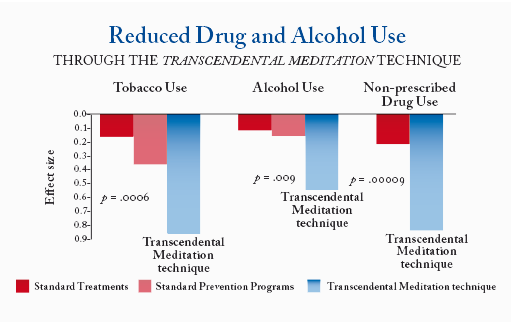
Business

Improved Employee Health
In a study conducted by researchers at the National Institute of Industrial Health of the Japanese Ministry of Labor and the St. Marianna Medi cal Institute, 447 industrial workers of Sumitomo Heavy Industries were taught the Transcendental Meditation technique and compared with 321 workers who did not learn the practice. The Transcendental Meditation technique group showed significantly decreased physical complaints, decreased impulsiveness, decreased emotional instability, decreased neurotic tendencies, decreased anxiety, and also decreased insomnia.
References: 1. Japanese Journal of Industrial Health 32 (1990): 656. 2. Japanese Journal of Public Health 37 (1990): 729.
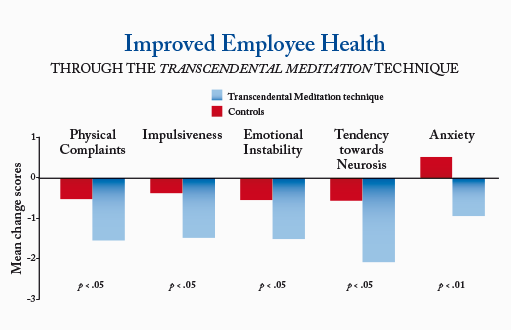

Enhanced Job Performance and Job Satisfaction
A study of executives and workers in the automotive industry found that after three months of regular practice of the Transcendental Meditation program, employees showed increased effectiveness on the job, as well as increased satisfaction with their professional and personal life, in comparison to controls from the same work sites.
References: 1. Anxiety, Stress, and Coping 6 (1993): 245–262. 2. Academy of Management Journal 17 (1974): 362–368.
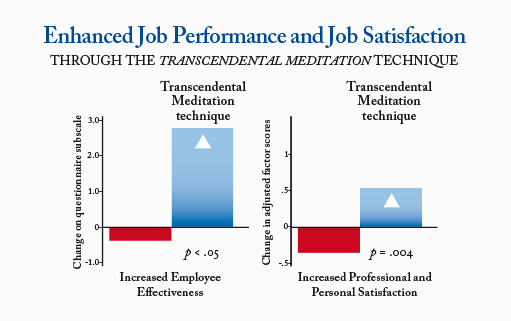
Rehabilitation

Reduced Recidivism
In this study, 259 male felon parolees of the California Depart ment of Corrections who learned the Transcendental Meditation technique while in prison had fewer new prison terms and more favorable parole outcomes each year over a five-year period after release compared to carefully matched controls. The Transcendental Meditation program was shown to significantly reduce recidivism during a period of six months to six years after parole, whereas prison education, vocational training, and psychotherapy did not consistently reduce recidivism.
References: 1. Journal of Criminal Justice 15 (1987): 211–230. 2. Journal of Offender Rehabilitation 36 (2003): 161–180. 3. Journal of Offender Rehabilitation 36 (2003): 181–203.
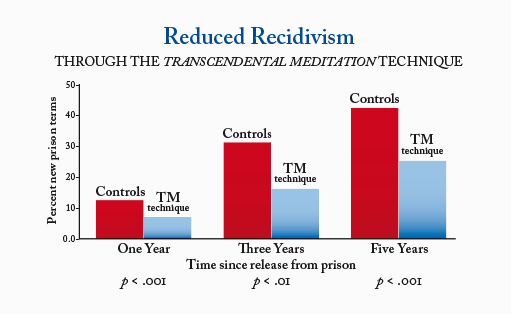

Decreased Crime in National Capital Districts
During periods in which large groups of participants in the Transcendental Meditation Sidhi Program exceeded the square root of one percent of the population, crime decreased in Washington, D.C. (daily violent crime, June–July 1993); in Metro Manila, Philippines (weekly crime index totals, mid-August 1984 to late January 1985); and in the Union Territory of Delhi, India (daily Indian Penal Code crimes, November 1980 to March 1981). The assembly in Washington, D.C., was much larger than the assemblies for the other two countries, with a correspondingly larger effect. Time series analysis verified that these decreases in crime could not have been due to trends or cycles of crime, to weather, or to changes in police policies and procedures.
References: 1. Social Indicators Research 47 (1999): 153–201. 2. The Journal of Mind and Behavior 8 (1987): 67–104.
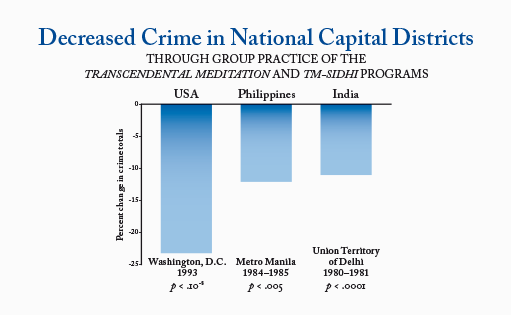
World Peace

Reduced International Conflict
During the periods of three large assemblies of experts in the Transcendental Meditation Sidhi Program, which approached or exceeded in number the square root of one percent of the world’s population, there was a significant decrease in international conflict worldwide, as measured by daily time series analyses of news events reported in the press. During the three assemblies there was also a significant reduction in fatalities and injuries due to international terrorism, as indicated by time series analysis of data provided by an independent research organization. Similar changes were not found in previous years during the calendar periods in which each assembly was held.
References: Journal of Offender Rehabilitation 36 (2003): 283–302.
